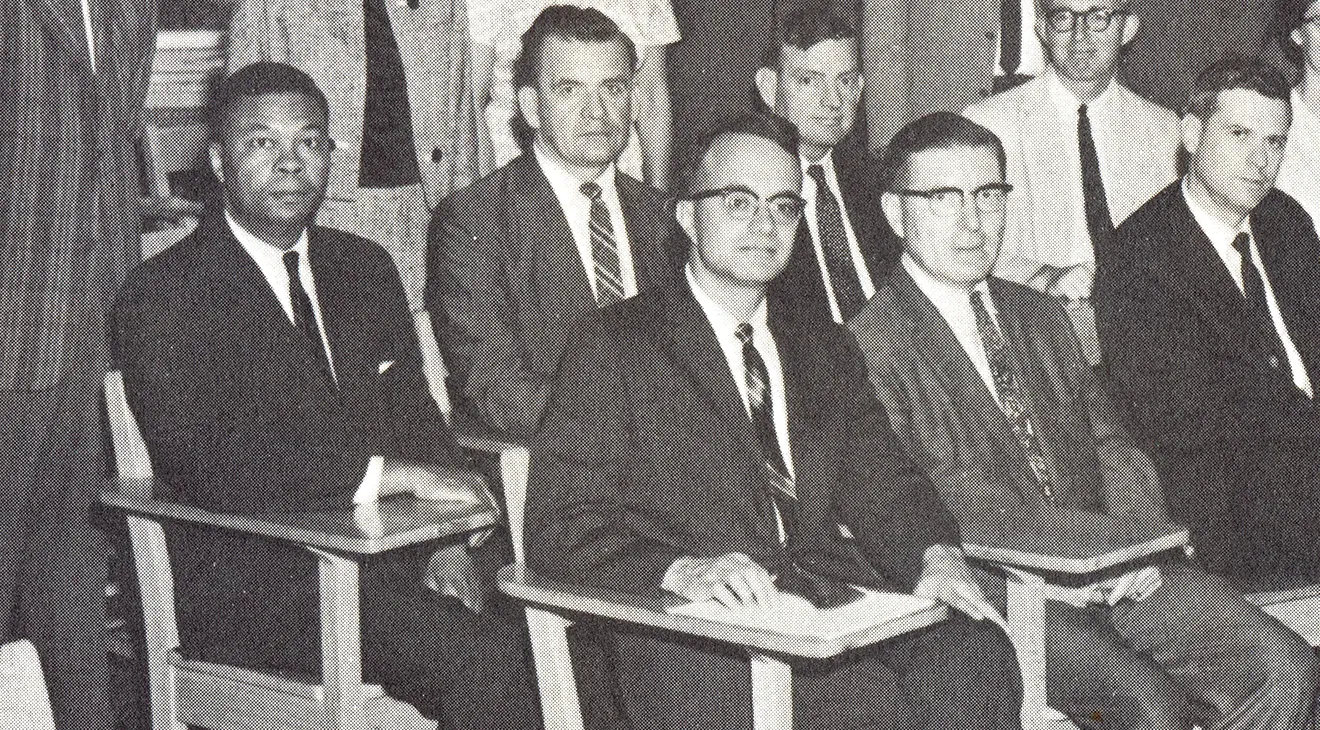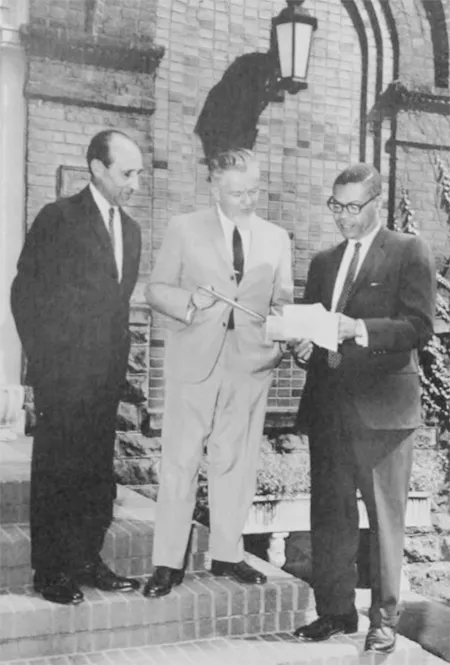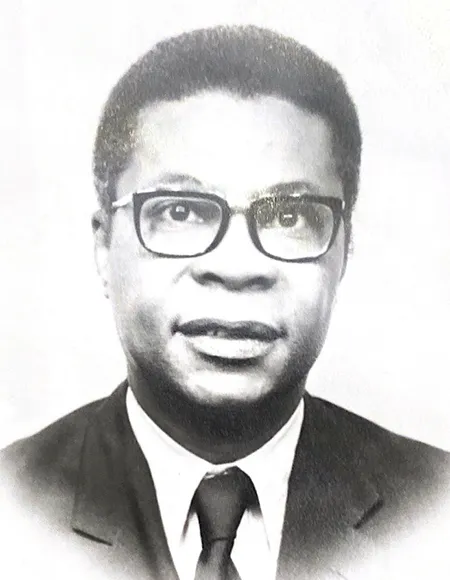
Robert Vowels, left, and the 1964 Indiana State College Social Sciences faculty (Courtesy of IUP Special Collections)
Robert C. Vowels holds a prominent place in IUP history as the school’s first Black professor. But that’s just one chapter in a remarkable book that Vowels authored over the 89 fascinating years he spent on this earth.
He was a humble yet proud man who never stopped learning, never stopped teaching, and never stopped believing the day would come when equality and justice would be a part of the American fabric. He was more than a professor. He was a civil rights activist, political architect, World War II veteran, published author, champion boxer, dedicated father, loving husband, and lifelong learner—plus so much more.
“He was my dad, but when I learned about all the things he did, he became this larger-than-life kind of person,” said Vowels’s son Scott. “He fought in Guadalcanal in World War II. He was a boxing champion. To me, he was such a regular guy, because he was so humble. But there was nothing regular about him.”
Examples of an Extraordinary Man
“I was getting my master’s in economics from Western Kentucky. I was taking an econometrics class. I can’t remember what the name of the author was, but my professor said it was the same book they use at Harvard. Well, I went home one weekend and told my dad that we were using the same book they use at Harvard. He said, ‘Yeah, that’s great.’ I said, ‘No, you don’t understand. They use it at Harvard.’ I kept pestering him, and he didn’t seem interested in it. Finally, he took me downstairs to his office and opened his filing cabinet. He pulled out a folder and showed me a letter inside it. It was a contract. That book I told him about? My dad had ghostwritten it.”
—Scott Vowels
“I remember it was my junior year of high school. There was one particular play where I made a tackle, landed awkwardly, flipped over headfirst, and pinched a nerve in my neck. I was on the ground, not moving, and the trainers and doctors were out on the field crowded over me. Then all of a sudden I heard this voice: ‘Bobby, are you OK?’ I said, ‘Dad, is that you? How did you get out here?’ He said, ‘I jumped the fence, and nobody was going to stop me.’ Mind you, we were in a 5,000-seat stadium with a chain-link fence around the field. People told me later that my dad had gotten out of the stands, run down to the field, and jumped over the fence in his suit, just to see if I was OK.”
—Robert Vowels Jr.
“I was a grad student at Tennessee State when he was a professor there. One day, I went to one of his lectures. The kids were not paying attention to anything he said. It made me sad, because they were not respecting my dad. Then he did something I had never seen anyone do before. He took a piece of chalk in his right hand and one in his left hand, and he started writing a formula on the chalkboard with both hands at the same time. His hands met in the middle, and all the kids just stared at him. They couldn’t believe what he had just done. It was amazing. After that, you could have heard a pin drop in there, because those kids paid him the attention he deserved.”
—Scott Vowels
“Scott was playing in the Nashville Open, a big tournament that attracted really good players from all over. My dad tried to get to as many of Scott’s tournaments as possible, as any parent would. The only issue was he would rarely sit and watch the match, because he was too nervous. He would walk around smoking a cigar, kind of peeping in every so often to see how the match was going. Here is a man who fought in World War II, serving his country, seeing all sorts of horrific things, but he could not watch his son play a tennis match, because he was too nervous to see the outcome.”
—Robert Vowels Jr.
“One time I took a young lady I was dating out to a Chinese restaurant with my parents. I had told her how smart my dad was. When they brought out the fortune cookies at the end, everyone was reading theirs out loud, but my dad was struggling to say his. I asked him, ‘What’s the matter?’ He snapped at me and said, ‘It’s been a long time since I’ve read Mandarin.’ He had the little slip of paper flipped backward.”
—Scott Vowels
Yet, when he died in 2014, Vowels’s 129-word obituary didn’t mention anything about his career, neither in the military nor in academia. It was a brief encapsulation of what Vowels held most dear: his family.
“Family was always number one to my dad,” said Robert Vowels Jr., the director of athletics at Detroit Mercy University. “He made time to always come to my high school and college football games, and after he retired, he went to a lot of the tennis tournaments that my brother Scott was playing in. And he loved our mom. He used to say that he was an atheist until he met Mom. When you asked him what changed, he would say that when he looked into our mother’s eyes, he saw God.”
While Vowels’s time at IUP was brief compared to the university’s nearly 150-year history—he came to Indiana in 1963 and left in 1969—his short tenure and the opportunities it presented him on campus and in the community played a pivotal role in the years that followed.

Vowels with colleagues in 1967 (Courtesy of IUP Special Collections)
“IUP was a springboard for a lot of things in his life,” said Robert Jr. “It was his first job in higher education. He became the dean of the School of Business at Clark Atlanta University, and he wouldn’t have done that if it weren’t for his time at IUP.”
Vowels was born in Baltimore in 1925 and was only 16 in 1942 when he dropped out of high school to follow his brother, Russell, into the US Navy following Japan’s attack on Pearl Harbor. When the war ended in 1945, Vowels did what now seems unthinkable: at 19, he went back to high school.
Using the GI Bill, Vowels enrolled at Howard University, where he earned both his bachelor’s and master’s degrees in economics. He spent a year at Harvard working toward a PhD when his alma mater offered him a position on the economics faculty, and his teaching career began. In 1961, he left Howard and took a job working for the federal government during the Kennedy Administration as an analytical statistician for the IRS. He and three other Black men hired at the same time were the first Black hires in the history of the US Department of the Treasury. He later served as a fiscal economist for the Office of Tax Analysis in the US Treasury.
“My dad was such a brilliant man,” said Scott, who is a published author and executive for Apple in San Francisco. “Until the day he died, he would go downstairs to his office and work on math equations. That’s what he loved to do. He loved to learn and solve problems.”
In 1963, Vowels was one of 38 new faculty hired at IUP, which then was Indiana State College. If there was any fanfare about Vowels being the school’s first Black professor, it was not documented. In the 1964 edition of the Oak, IUP’s yearbook, Vowels is in the group photo for the Social Sciences faculty, but there is no mention of his place in history.
But that seems to be fitting for Vowels. His sons said he didn’t like to brag about his accomplishments, and he didn’t seek attention for the things he did, preferring instead to let his work talk for him.
On August 28, 1963, the Indiana Evening Gazette ran a story about the new hires at ISC, and like the other 37 new employees, only Vowels’s academic credentials are listed. There is no mention of him being the school’s first Black faculty member.
Yet it’s all but certain Vowels did not sit down that evening and read the paper about his new job. He had spent the day with Robert Jr. in Washington, DC, taking part in the March on Washington, the event in which Martin Luther King Jr. delivered his famous “I Have a Dream” speech in front of a quarter-million people.
“We always had people coming by the house, sometimes students, to talk about civil rights issues,” said Robert Jr. “He loved to be involved.”
Vowels was a busy man in Indiana. He was president of the Indiana-Blairsville chapter of the NAACP and was an in-demand speaker on civil rights topics, sharing perspectives of the Black community with the heavily White county. Mary Vowels, to whom Robert was married for 61 years, was often at her husband’s side. She was an active participant in many of the civil rights events that Robert organized, attended, or spoke at.
All the while, Vowels was working to complete his doctoral degree, and in 1964 he was awarded a PhD in economics from American University. His dissertation was titled “An Evaluation of Equity and Economic Effects in Capital Gains Taxation.”
But the thing that Vowels was most proud of was his family, and the times Robert Jr. and Scott spent with their father made indelible marks on their careers.
In 1967, when Robert Jr. was nine years old, he went with his father to an IUP football game against Delaware State at Miller Stadium. The youngster saw and felt the atmosphere of college football and knew it was something he needed to be part of. That single day, a 16-0 IUP win fueled Robert Jr.’s love of football, and he went on to earn a scholarship to play the sport at Duke University. He then began a career in college athletic administration, including an upper-management role at the NCAA and two stints as commissioner of two college athletic conferences.
“I am very fortunate for both of my parents,” he said. “I wouldn’t be doing what I am now if it weren’t for them. They opened the door for me to explore and find what I love.”
Scott Vowels, who was born in Indiana in 1965, played professional tennis for a decade after college, traveling the globe in search of championships.

Robert Vowels
“My dad didn’t talk much to me about tennis,” Scott said. “But when he was older, like around 80, he showed me those two scrapbooks he had kept of newspaper articles about me. He even had a newspaper from Africa. That told me so much about him. He was proud of me.”
Vowels left IUP in 1969 for Clark Atlanta. While there, he launched the school’s MBA program and helped the school grow in many other ways. Additionally, he was active in local politics, and he had a significant role in launching Maynard Jackson’s campaign to be mayor of Atlanta in 1973. Jackson garnered more than 60 percent of the vote and became the city’s first Black mayor.
In the 1980s, Vowels went back to the classroom as a professor at Tennessee State University, a post he held until retirement. He died on September 15, 2014, at his home in Nashville. Upon his death, Vowels was lauded by many people who knew him, and in almost a decade since then, the respect still flows.
A few years ago, well-known activist and politician John Lewis visited the Apple home base in California. Scott Vowels remembered his brother telling him that when they were kids living in Atlanta, Lewis would often come to their house to meet with their father. So when Scott had the opportunity, he approached Lewis and introduced himself.
“I asked him if he remembered my dad,” Scott recalled. “He said, ‘Oh, yes, I remember him.’ I told him that my father had recently passed. He grabbed me and hugged me and started crying. He’s this legendary guy, and I’m just me, and he’s hugging me and telling me what a great man my father was. That meant a lot to me.”
Robert Vowels was a talented, brilliant, caring man who used his 89 years to make impacts far and wide. But the influence IUP made on Vowels is quite noticeable in the career he found—and the legacy he left.